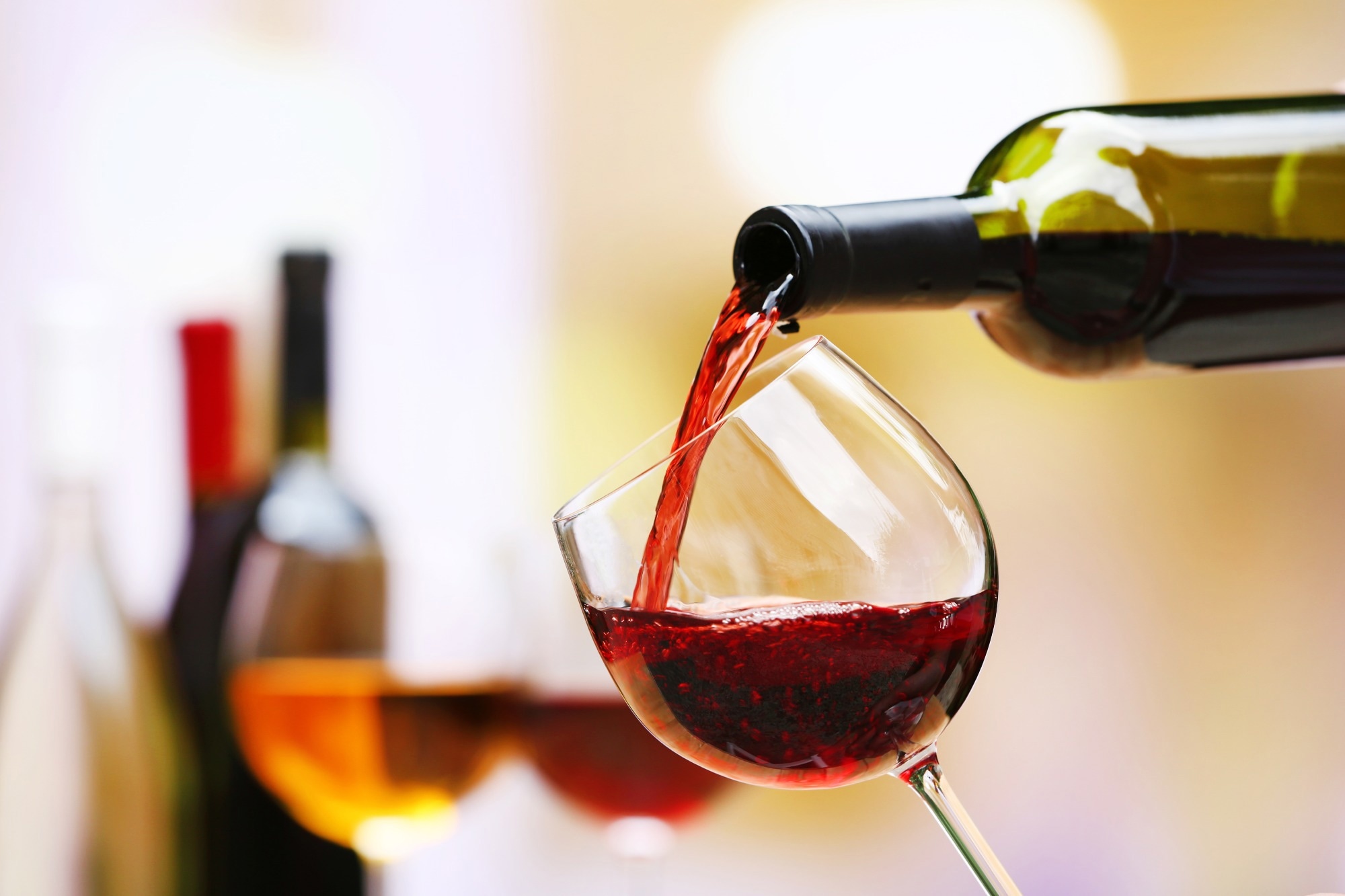Resveratrol is strongly associated with red grapes and red wine made from grapes. Wines such as Malbec, Petite Sirah, St. Laurent, and Pinot Noir have the highest resveratrol content. Malbec grapes have the thickest skin and, therefore, the highest resveratrol content.

Image Credit: Africa Studio / Shutterstock.com
How the wine preparation process determines resveratrol content
The concentration of resveratrol in any given red wine depends on the region from which it comes. Dark red and purple grapes have a higher concentration of this polyphenol. The concentration in wine varies, however, mainly with the wine-making process rather than the type of grape that goes into the wine.
Traditional wine-making techniques, particularly maceration and extended fermentation, produce the highest concentration of resveratrol in red wine as compared to carbonic maceration. For full extraction of various plant pigments and antioxidants from the grape skins and seeds, the wine must be in contact with them until the fermentation process is complete.
The skins floating on top should be pushed down repeatedly when the wine is stirred so that they and the seeds are in increased contact with the wine. Red wine prepared through this method has the highest resveratrol concentration.
Health benefits of wine
Red wines have a resveratrol content (per 5-oz glass) of 0.03-1.07 milligrams (mg), comparable to the resveratrol content in white wines, typically in the range of 0.01-0.27 mg. Red grape juice contains 0.017-1.30 mg per 5 oz.
There is considerable debate surrounding whether the known heart-healthy actions of a moderate glass of red wine every day are due to the resveratrol or the alcohol content of the wine. This debate is fueled by the fact that resveratrol has not yet been shown to increase lifespan or reduce mortality in a healthy older population.
Studies have indicated that resveratrol exhibits several biological activities, including antioxidant, anti-inflammatory, cardioprotective, and neuroprotective effects. Yet, alcohol has the following independent impacts that contribute to reduced atherosclerosis risk and a 20-30% reduction in coronary heart disease:
- Increases high-density lipoprotein (HDL)
- Lowers low-density lipoprotein (LDL)
- Reduces blood pressure
- Prevents blood clot formation
The truth about red wine
Wine consumption and health considerations
Would grape juice produce the same effects as red wine? Apparently, despite the high resveratrol concentrations in the latter, their results in terms of actual health are comparable.
What does a healthy glass of red wine mean? It could be translated into 1-2 5-oz glasses of red wine or just one for women. The female body has lower water content, leading to a higher alcohol concentration.
Knowing the all-too-familiar side effects of too much alcohol, including alcoholism, liver damage, brain damage, mental problems, diabetes, high blood pressure, stroke, and heart disease, as well as cancer, the unclear correlation between resveratrol and heart health should not be interpreted as a license to imbibe red wine freely.
Additionally, resveratrol has been found to modulate several cellular processes and signaling pathways, contributing to its potential therapeutic benefits. However, the bioavailability of resveratrol in humans is relatively low, which poses a challenge for its effectiveness.
Conclusion
An after-dinner glass of red wine makes for an enjoyable sip; however, in view of the evidence gathered so far, consuming more alcohol than this is not a healthy practice. Those who abstain from alcohol can still enjoy the health benefits of resveratrol from non-alcoholic red wine and red grape juice.
According to our current knowledge, alcohol is more likely to be responsible for the heart-healthy effects of red wine than resveratrol in humans. Yet, red wine can become an enemy if too much is consumed because of the adverse health effects of the alcohol in it.
References
- Ector, B. J., Magee, J. B., Hegwood, C. P., & Coign, M. J. (1996). Resveratrol Concentration in Muscadine Berries, Juice, Pomace, Purees, Seeds, and Wines. American Journal of Enology and Viticulture, 47(1), 57–62. https://doi.org/10.5344/ajev.1996.47.1.57, http://www.ajevonline.org/content/47/1/57.abstract
- Resveratrol. (2014, April 29). Linus Pauling Institute. http://lpi.oregonstate.edu/mic/dietary-factors/phytochemicals/resveratrol, http://lpi.oregonstate.edu/mic/dietary-factors/phytochemicals/resveratrol
- Behrooz Mohammadparast, Mousa Rasouli, & Mahin Eyni. (2024). Resveratrol Contents of 27 Grape Cultivars. Applied Fruit Science/Applied Fruit Science. https://doi.org/10.1007/s10341-024-01060-5, https://link.springer.com/article/10.1007/s10341-024-01060-5
- Bejenaru, L. E., Biţă, A., Belu, I., Segneanu, A.-E., Radu, A., Dumitru, A., Ciocîlteu, M. V., Mogoşanu, G. D., & Bejenaru, C. (2024). Resveratrol: A Review on the Biological Activity and Applications. Applied Sciences, 14(11), 4534. https://doi.org/10.3390/app14114534, https://www.mdpi.com/2076-3417/14/11/4534
Further Reading
Last Updated: Jun 13, 2024